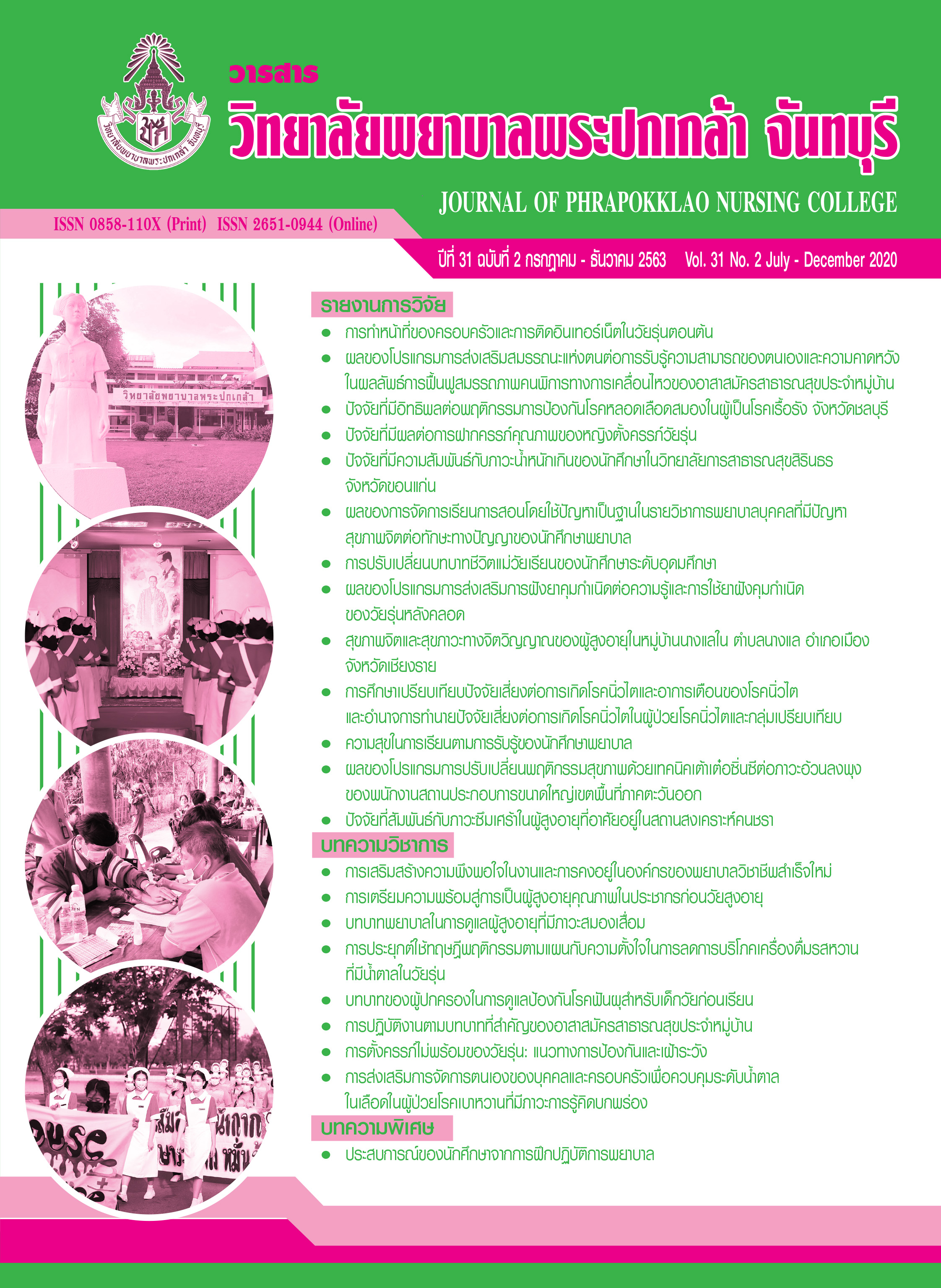Promoting Individual and Family Self-management for Glycemic Control in Diabetic Patients with Cognitive Impairment
Keywords:
Promoting individual and family self-management, Glycemic control, Diabetic patient, Cognitive impairmentAbstract
Promoting individual and family self-management is an effective method of behavior modification for glycemic control in diabetic patients with cognitive impairment. Those patients have the cerebral function decline causing the limitation of self-management. Enhancing family participation in planning and managing patient behaviors is very necessary. It is also a factor contributing to the success of glycemic control. Nurses are important persons who can assess and screen diabetic patients for understanding their problems for planning to each patient. Effective and specific instrument namely Montreal Cognitive Assessment–Basic (MoCA-B) was utilized. When assessing cognitive impairment patients, nurses can bring this information used as a basis for caring and controlling the glycemic level among patients and their families.
References
กองโรคไม่ติดต่อ กรมควบคุมโรค. (2563). จำนวนอัตราป่วย ตาย โรค NCDs ปี 2559–2562. สืบค้นจาก http://www.thaincd.com/2016/mission/documents-detail.php?id=13893&tid=32&gid=1-020
ก้องเกียรติ กูณฑ์กันทรากร. (2553). ประสาทวิทยาทันยุค. กรุงเทพฯ: พราวเพรส.
จันจิรา หินขาว, ขนิตฐา หาญประสิทธิ์คำ, และสุนทรี เจียรวิทยกิจ. (2562). ผลของโปรแกรมการจัดการตนเองร่วมกับการสัมภาษณ์เพื่อสร้างแรงจูงใจ เพื่อชะลอไตเสื่อมจากเบาหวานต่อพฤติกรรมการจัดการตนเองและผลลัพธ์ทางคลินิกในผู้ป่วยเบาหวานชนิดที่ 2 ที่มีความเสื่อมของไตระยะที่ 3. วารสารวิทยาลัยพยาบาลพระปกเกล้า จันทบุรี, 30(2), 185–202.
จินตนา หามาลี, นัยนา พิพัฒน์วณิชชา, และรวีวรรณ เผ่ากัณหา. (2557). ผลของโปรแกรมการส่งเสริมการรับรู้ตามแบบแผนความเชื่อด้านสุขภาพต่อพฤติกรรมการชะลอความก้าวหน้าของโรคไตเรื้อรังในผู้สูงอายุโรคเบาหวานชนิดที่ 2 ที่มีภาวะเสี่ยงต่อการเกิดโรคไตเรื้อรัง. วารสารพยาบาลสงขลานครินทร์, 34(2), 67–86.
ทัศนีย์ กาศทิพย์, สุปรีดา มั่นคง, และพรทิพย์ มาลาธรรม. (2562). ภาวะสุขภาพของผู้สูงอายุที่มีภาวะรู้คิดบกพร่อง. วารสารสภาการพยาบาล, 34(1), 104–121.
ศิริลักษณ์ ถุงทอง. (2557). ผลของโปรแกรมสนับสนุนการจัดการตนเองเพื่อชะลอไตเสื่อมจากเบาหวานต่อพฤติกรรมการจัดการตนเองและผลลัพธ์ทางคลินิกในผู้ป่วยเบาหวานชนิดที่ 2 ที่ไม่สามารถควบคุมระดับน้ำตาลในเลือดได้ (วิทยานิพนธ์ปริญญามหาบัณฑิต). มหาวิทยาลัยสงขลานครินทร์.
อภิชัย สิรกุลจิรา. (2560). ความสัมพันธ์ระหว่างการควบคุมระดับน้ำตาลในเลือดกับการเกิดภาวะเสี่ยงสมองเสื่อม ในผู้ป่วยเบาหวานชนิดไม่พึ่งอินซูลิน. วารสารกรมการแพทย์, 42(1), 112–117.
Cooper, C., Li, R., Lyketsos, C., & Livingston, G. (2013). A systematic review of treatments for mild cognitive impairment. The British Journal of Psychiatry, 203(3), 255–264. doi:10.1192/bjp.bp.113.127811
Julayanont, P., Tangwongchai, S., Hemrungrojn, S., Tunvirachaisakul, C., Phanthumchinda, K., Hongsawat, J., … Nasreddine, Z. S. (2015). The Montreal Cognitive Assessment–Basic: A screening tool for mild cognitive impairment in illiterate and low-educated elderly adults. Journal of the American Geriatrics Society, 63(12), 2550–2554. doi:10.1111/jgs.13820
Kanaya, A. M., Barrett-Connor, E., Gildengorin, G., & Yaffe, K. (2004). Change in cognitive function by glucose tolerance status in older adults: A 4-year prospective study of the Rancho Bernardo study cohort. Archives of Internal Medicine, 164(12), 1327–1333. doi:10.1001/archinte.164.12.1327
Luchsinger, J. A., Palmas, W., Teresi, J. A., Silver, S., Kong, J., Eimicke, J. P., … Shea, S. (2011). Improved diabetes control in the elderly delays global cognitive decline. The Journal of Nutrition, Health & Aging, 15(6), 445–449. doi:10.1007/s12603-011-0057-x
Moran, C., Phan, T. G., Chen, J., Blizzard, L., Beare, R., Venn, A., … Srikanth, V. (2013). Brain atrophy in type 2 diabetes: Regional distribution and influence on cognition. Diabetes Care, 36(12), 4036–4042. doi:10.2337/dc13-0143
Palta, P., Schneider, A. L. C., Biessels, G. J., Touradji, P., & Hill-Briggs, F. (2014). Magnitude of cognitive dysfunction in adults with type 2 diabetes: A meta-analysis of six cognitive domains and the most frequently reported neuropsychological tests within domains. Journal of the International Neuropsychological Society, 20(3), 278–291. doi:10.1017/S1355617713001483
Ryan, P., & Sawin, K. J., (2009). The Individual and Family Self-Management Theory: Background and perspectives on context, process, and outcomes. Nursing Outlook, 57(4), 217–225. doi:10.1016/j.outlook.2008.10.004
Shorr, R. I., de Rekeneire, N., Resnick, H. E., Yaffe, K., Somes, G. W., Kanaya, A. M., … Harris, T. B. (2006). Glycaemia and cognitive function in older adults using glucose-lowering drugs. The Journal of Nutrition, Health & Aging, 10(4), 297–301.
Tangalos, E. G., & Petersen, R. C. (2018). Mild cognitive impairment in geriatrics. Clinics in Geriatric Medicine, 34(4), 563–589. doi:10.1016/j.cger.2018.06.005
Vincent, C., & Hall, P. A. (2015). Executive function in adults with type 2 diabetes: A meta-analytic review. Psychosomatic Medicine, 77(6), 631–642. doi:10.1097/PSY.0000000000000103
Zhang, X., Huang-Fu, Z., Lang, X. Y., Chun, P., Chi, Y. Y., Yuan, X. Y., & Wang, X. G. (2019). Pathological and cognitive changes in patients with type 2 diabetes mellitus and comorbid MCI and protective hypoglycemic therapies: A narrative review. Reviews in the Neurosciences, 30(7), 757–770. doi:10.1515/revneuro-2018-0083
Zhang, Y., Zhang, X., Zhang, J., Liu, C., Yuan, Q., Yin, X., ... & Wang, J. (2014). Gray matter volume abnormalities in type 2 diabetes mellitus with and without mild cognitive impairment. Neuroscience Letters, 562, 1–6. doi:10.1016/j.neulet.2014.01.006
Downloads
Published
How to Cite
Issue
Section
License
Copyright (c) 2020 JOURNAL OF PHRAPOKKLAO NURSING COLLEGE

This work is licensed under a Creative Commons Attribution-NonCommercial-NoDerivatives 4.0 International License.
เนื้อความ ข้อมูล และรายการอ้างอิงที่ผู้เขียนใช้ในการเขียนบทความเพื่อลงตีพิมพ์ในวารสารวิทยาลัยพยาบาลพระปกเกล้า จันทบุรี ถือเป็นความคิดเห็นและความรับผิดชอบของผู้เขียน คณะผู้จัดทำวารสารไม่จำเป็นต้องเห็นพ้องด้วยหรือร่วมรับผิดชอบ
บทความที่ได้รับการลงตีพิมพ์ในวารสารวิทยาลัยพยาบาลพระปกเกล้า จันทบุรี ถือเป็นลิขสิทธิ์ของวารสารวิทยาลัยพยาบาลพระปกเกล้า จันทบุรี หากหน่วยงานหรือบุคคลใดต้องการนำส่วนหนึ่งหรือทั้งหมดของบทความไปเผยแพร่ต่อเพื่อวัตถุประสงค์ใด ๆ จะต้องได้รับอนุญาตจากบรรณาธิการวารสารก่อน



